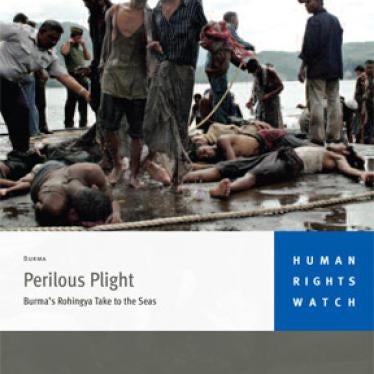(New York) - The Thai government should investigate reports that authorities forcibly pushed back to sea 91 ethnic Rohingyas seeking asylum, Human Rights Watch said today. The Rohingyas subsequently washed up in India's Andaman and Nicobar islands, more than 700 kilometers away, in a boat that the BBC reported did not have a motor. The Thai Foreign Ministry has denied reports that the boat, which first landed in Trang province on January 22, 2011, was set adrift from Thailand.
"Thailand's blanket denial that 91 Rohingya deportees were pushed back to sea fails to explain their arrival in the Andaman and Nicobar islands," said Brad Adams, Asia director at Human Rights Watch. "The Thai government should promptly and impartially investigate which officials were responsible for towing migrants out to sea and cutting them loose. When Thai authorities were caught two years ago pushing Rohingya boats out to sea, the prime minister promised to hold all those involved to account."
Since mid-January, three boats of Rohingya are known to have arrived on the Thai coast. Another boat carrying 129 Rohingya landed in Aceh province of Indonesia on February 16. At least five additional boats are believed to have left Bangladesh and remain at sea.
In January 2009, Prime Minister Abhisit Vejjajiva chaired a meeting of Thailand's National Security Council that authorized the navy to intercept incoming Rohingya boats and detain the passengers in off-shore holding centers. Later that year, Thai security forces were captured on video towing boats with Rohingyas out to sea, which the government initially denied. Prime Minister Abhisit later stated in a media interview: "It's not exactly clear whose work it is. All the authorities say it's not their policy, but I have reason to believe some instances of this happened, but if I can have the evidence as to who exactly did this I will certainly bring them to account."
Under the Universal Declaration of Human Rights, everyone has the right to seek asylum from persecution. While Thailand is not a party to the 1951 Refugee Convention, under customary international law the Thai government has an obligation of "nonrefoulement" - not to return anyone to a country where their life or freedom is at risk.
Each year hundreds of thousands of Rohingya in Burma's northern Arakan state flee repression by the Burmese military government and dire poverty. Boatloads of Rohingya men and boys pay to be smuggled to Malaysia from Burma and neighboring Bangladesh, often on decrepit boats.
About 200,000 Rohingya refugees live in Bangladesh, many in squalid conditions in official and makeshift refugee camps. Because Bangladesh authorities do not give unregistered Rohingya official resident or work papers, they live in fear of arrest, long-term detention, and possible repatriation to Burma.
Burmese authorities have systematically persecuted the Rohingya, a Muslim minority, for more than 30 years. Government and military authorities in Arakan state regularly apply severe restrictions on Rohingya's freedom of movement, assembly and association, levy demands for forced labor, engage in religious persecution, and confiscate land and resources. The Burmese government refuses to recognize Rohingya as citizens, leaving them stateless.
"The plight of the Rohingya begins with the Burmese government's brutal violations of their basic rights and frequently extends to the countries where they flee," Adams said. "Burma's neighbors in ASEAN seeking a solution to the Rohingya problem should start by forcefully demanding that the Burmese government immediately end its discrimination and abuse of the Rohingya."
Human Rights Watch said that governments in the region should ensure that their laws and procedures recognize the protection needs of stateless people as well as refugees. The United Nations High Commissioner for Refugees (UNHCR) has the technical expertise to screen for refugee status and the mandate to protect refugees and stateless persons.
The UN agency should be granted immediate and unhindered access to all boat arrivals of Rohingya in Thailand and other countries in Southeast Asia and India, Human Rights Watch said. Some boats landing in Thailand have, at times, carried both Rohingya and Bangladeshi nationals pretending to be Rohingya. Effective UNHCR screening would help the governments throughout the region separate genuine refugee claims by Rohingya from other claims.
"Refugee screening is the first step in protecting Rohingya asylum seekers," Adams said. "Until then, the governments of Bangladesh, India, Thailand, Malaysia, and Indonesia should halt forcible returns of Rohingya. But a comprehensive solution requires the rights of the Rohingya to be respected in their homeland in Burma."







